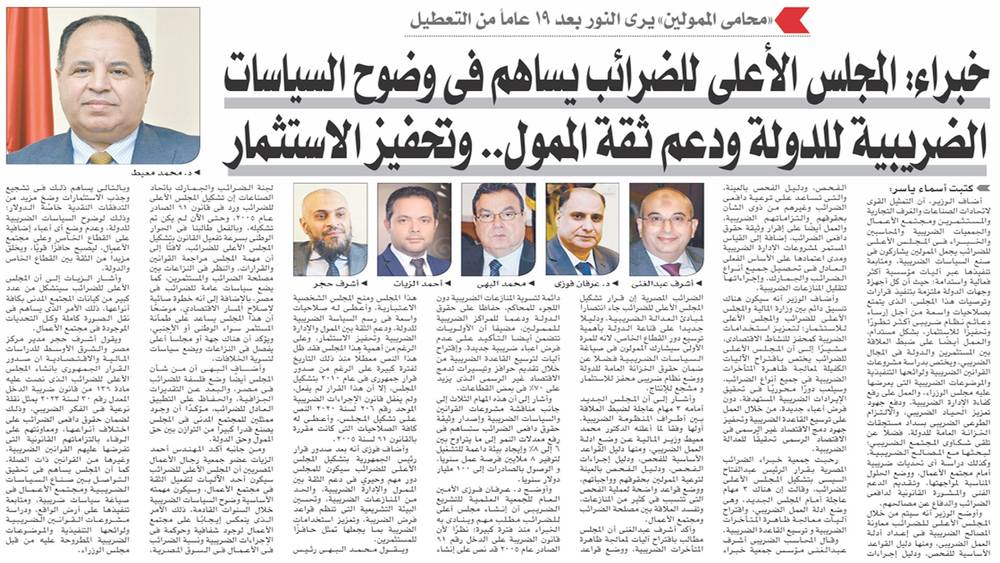Experts: The Supreme Tax Council contributes to the clarity of the state's tax policies and supports the confidence of the financier. and stimulate investment
President Abdel Fattah El-Sisi issued a decision to form the Supreme Council for Taxes, to see the light of the Council after 19 years of its disruption
![]() Ashraf Hagar - • General Topics
Ashraf Hagar - • General Topics

President Abdel Fattah El-Sisi issued a decision to form the Supreme Council for Taxes
Copyto see the light of the Council after 19 years of disruption, as the Income Tax Law issued in 2005 stipulated the establishment of the Council, which is considered a lawyer for financiers before the tax administration, but that was not done until the Republican decision was issued a few days ago to form the Council.
Dr. Mohamed Maait, Minister of Finance, stressed that the issuance of a presidential decree to form the Supreme Council for Taxes headed by the Prime Minister and the membership of heads of federations of industries, chambers of commerce, investors, representatives of the business community, tax associations, accountants, and experts in the economic, public financial and tax fields from university professors is integrated with the state's efforts in the path of economic reform to empower the private sector, stimulate investment, and encourage investors to expand their production and export activities, in a way that contributes to strengthening the macroeconomic structure and raising growth rates. Driven by greater contributions of the private sector to the process of inclusive and sustainable development.
The minister added that the strong representation of industry federations, chambers of commerce, investors, the business community, tax associations, accountants and experts in the Supreme Tax Councilmakes financiers participate in making tax policies, and follow up their implementation through more effective and sustainable institutional mechanisms, as all state agencies and agencies are committed to implementing the decisions and recommendations of this council, which has broad powers in order to lay the foundations of a more developed tax system and stimulate investment, in a sustainable manner, and also work to control the relationship between investors. The state is concerned with studying draft tax laws, their executive regulations and tax topics presented to it by the Council of Ministers, working to raise the efficiency of tax administration, pushing efforts to enhance tax neutrality, and voluntary tax commitment to pay the dues of the state's general treasury, as well as receiving complaints from the tax community to discuss them with tax interests, as well as studying any tax challenges facing the business community, developing appropriate solutions to confront them, and providing technical support and legal advice to taxpayers and defending their interests.
The minister explained that through the Supreme Tax Council, tax authorities will be assisted in preparing tax work guides, including the basic rules manual for examination, the examination procedures manual, and the sample examination manual, which help educate taxpayers and other stakeholders about their tax rights and obligations, and also work to approve the taxpayers' rights document, in addition to the continuous measurement of tax administration projects and the extent to which they are adopted on the actual fair basis in the collection of all types of taxes and customs, and their procedures to reduce tax disputes. He pointed out that the Supreme Tax Council is competent to propose mechanisms to address the phenomenon of tax arrears in all types of taxes, and will play a pivotal role in achieving targeted tax revenues, without imposing new burdens, by working to expand the tax base and stimulate efforts to integrate the informal economy into the formal economy to achieve tax justice. President Abdel Fattah El-Sisi's decision to form the Supreme Council for Taxes, she said that there are 3 urgent tasks before the new council, namely developing tax work guides, proposing mechanisms to address the phenomenon of tax arrears and expanding the tax base.
Ashraf Hajar, Director of the Egypt and Middle East Center for Financial and Economic Studies
CopyThe issuance of the presidential decree to establish the Supreme Tax Council, which was stipulated in Article 139 of the amended Income Tax Law No. 30 of 2023, represents a qualitative leap in tax thought, in order to ensure the rights of taxpayers of all kinds, and help them fulfill their legal obligations imposed on them by tax laws, and other relevant laws, and the Council also contributes to achieving communication between tax policymakers and the business community in formulating tax policies, following up on their implementation on the ground, and studying projects Tax laws, their implementing regulations and tax topics submitted to it by the Council of Ministers
link articel : (akhbarelyom)